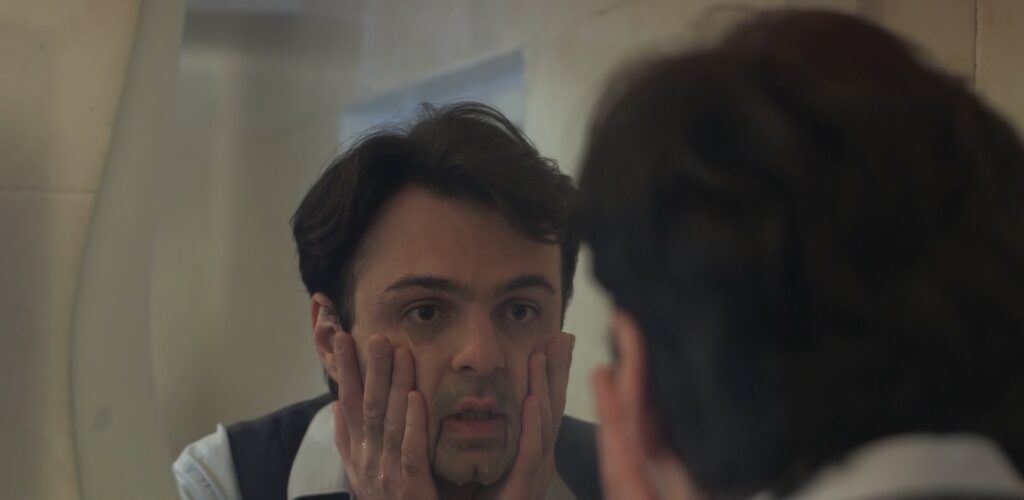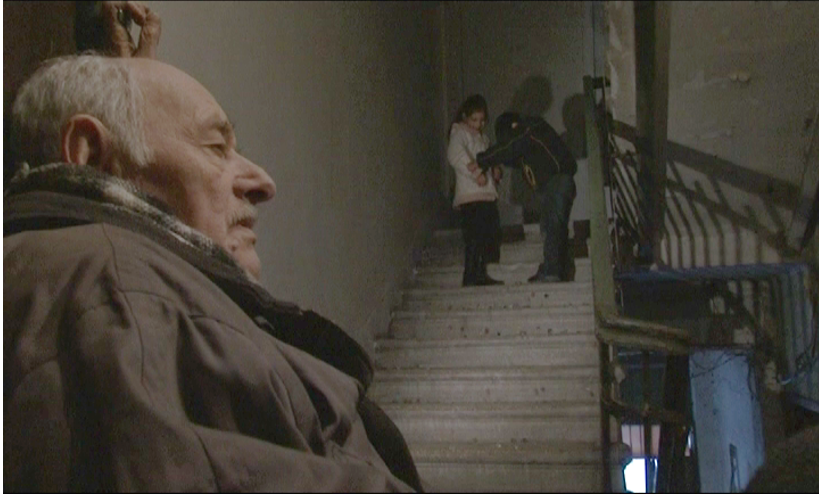Life is a strange thing. You never know what to expect from it. Sometimes you have the feeling that someone is watching your daily life and creates a problem for you at the very moment when you least expect it and when you are least ready to repel; when you think that you are already at peace and the mistakes made in your previous life will no longer affect you; when you think that those people, their pain, your guilt, shame, regret, what happened before, are forever in the past. But the meaning of life lies in this – it is constantly up and down, never perfect and straight. It can reach out to you just when you are hopeless and desperate, and vice versa, when everything is fine and you think you have overcome all difficulties. It might catch up not new, but even old, well-forgotten sins on the way.
Levan Shubashvili's student film "Short Film About Friends" (2016) tells a story about old acquaintances from the university, their shared memories and the present in a very simple language. There are five main characters in the film (the voice of the sixth is only heard through the phone).
Although the central part of the story takes place in one of the friends’ house, certain key issues are revealed to the audience from the very first scene of the film. In particular, Shako Mirianashvili’s character (his name is not known) appears in the car, going to his friend's house, talking to his wife, Tea (whom he met at the university) on the phone, and it is through their dialogue that it becomes known about their two mutual friends, Kakha (Giorgi Iarajuli) and Eka's (Natalia Kuloshvili) past love relationship.
A strong cinematic style cannot be distinguished in the film. Of course, there are some moments that can stand out, but the main driving force of the film is the story and the dialogue between the friends.
At a glance, the friends gathered at Lado's (Beka Magalashvili) house are trying to have a good time, however, despite these efforts, the tension between the friends is still easily visible. They try to overcome this, as if by force, by introducing different conversational topics in order to avoid the undesirable, uncomfortable silence for everyone. The estrangement between this circle and Kakha is especially noticeable, which is explained by Kakha's life in Germany for several years. After all, he has just returned to his homeland and it is logical that they can no longer feel comfortable and direct with each other, as they did during the university years. In addition, everyone has a special awe towards Kakha as he seems to be better than them. Later the reason becomes known. Friends are grateful to Kakha for the heroic act he did years ago – he saved from prison one of his friends, who was punished for organizing anti-government rallies (after brutally informed by someone).
The environment where these people are, in turn, responds to this not so pleasant situation. Friends are sitting around a table in one room. Although the light is on in the room, it is still dark. The cameraman (Elia Parsadanishvili) mainly works on character portraits. The average and overall view is almost non-existent. It alternates between showing their faces depending on who is speaking at the moment. Fast, rough editing moves are common. This monotony, in fact, forces the viewer to completely listen to the characters’ conversation and to divert attention to nothing else (nothing at all).
Eka clearly manages to create discomfort for Kakha and disturb his peace. Initially, you think it's just a feeling of discomfort caused by the presence of an old lover there and nothing more, but later, thanks to Eka, the real reason for Kakha's tension is revealed.
Eka is portrayed quite well by Natalia Kuloshvili. She perfectly manages to convey the feelings of a woman who has not yet forgotten her old love, still has a glimmer of hope left, which she tries so hard to hide. At the beginning of the film, while talking to a friend on the phone, she says the following phrase: "I want to see Kakha, I'm wondering what he will tell me...but I don’t care either…". These last three words of hers are clearly not true. Eka's attitude towards Kakha is evident from the beginning in the phone conversation between Tea and her husband. According to Tea, "she doesn't know anything about Kakha, but time doesn't matter to Eka."
Eka is also the only one who is interested in Kakha's personal life. It is after her question that Kakha admits that he got married. Of course, everyone has a very bad reaction to this. The friends can't believe that Kakha, a person they consider a close friend, has kept the news of his wife from them. Kakha tries to justify himself, saying that he wanted to surprise them, but this is a big lie. He was simply afraid of Eka's reaction. Kakha should not have angered Eka under any circumstances...
The friends’ reaction can't even compare to Eka's condition after she learns the story of Kakha's wife. Her expression changes momentarily, she stops, her eyes become speechless. She shuts off from reality, she no longer hears the voices of others, although she tries to pretend to them with her mimicry that she listens to everything attentively.
The best part of the film is these few minutes. The cameraman’s work also contributes to this. The camera is completely focused on Eka's face at this time. The shot fades to gray, then blue, the sound of Chopin's gentle music slowly enters, which further enhances Eka's emotional state. A woman is disconnected from reality, moves into imagination. The place is completely black, only the light source hits Eka's face. In this imagination, she meets Kakha and has a non-existent dialogue with him. Eka is disappointed and confused, the story of Kakha's wife drives her to despair, and revenge remains the only driving force for awakening. As soon as she comes to her senses, she goes straight to the attack, gets involved in the conversation and brings to the surface the long-forgotten story that leveled Kakha's reputation to the ground. She will reveal Kakha's secret that he was the one who was his friend’s informer. It turned out that the person who was the savior of the entire community for so long was actually a traitor. In this case, Eka reminds us of Medea, who gave up a lot for the man she loved, but as soon as the latter betrayed her for another woman, she immediately killed him with bitter revenge. Kakha turns out to be a terribly selfish, narcissistic and cowardly person, who reveals his real face in an unusual way, when he leaves the place in a shameful manner, for no reason at all. In fact, he runs away.
The plot of the film is not very original and impressive. It seems that the director did not spend much time thinking of the title. It would not be so difficult to choose a name for a (quite banal) film with this plot, however, the director chose to give such a meaningless name to the film – "Short Film About Friends" (if it can be called a title at all).
It probably goes without saying that this is really a short film about friends, but are they really friends? We might look for signs of sarcasm in such a title? I don't know about the others but one of them is definitely not their friend, and as it turns out, he has never been one.
Elene Tsagareishvili






